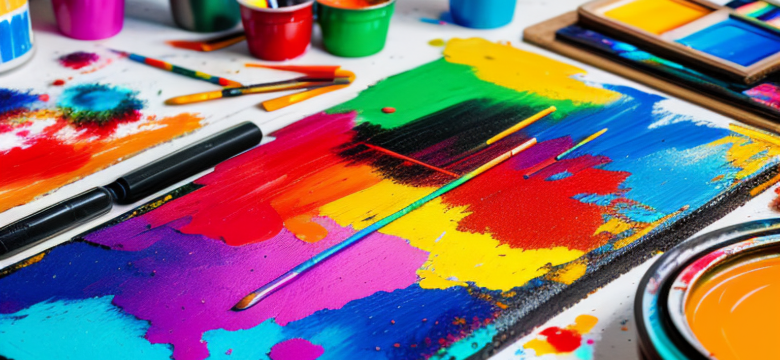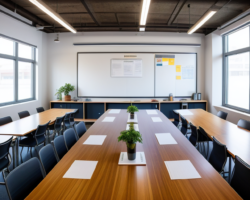Welcome to the world of **innovative workshops**! If you’ve ever felt the drag of a dull seminar, you’re not alone. The good news is that you can transform any workshop into a thrilling experience that not only engages participants but also fosters **creativity** and **collaboration**. Imagine walking into a room buzzing with excitement, where every participant is eager to share their ideas and learn from one another. That’s the magic of effective workshop strategies!
In this article, we’ll explore some **truly effective workshop ideas** that you can easily implement. From starting with **interactive icebreakers** that lighten the mood to incorporating **hands-on activities** that allow participants to put theory into practice, the possibilities are endless. Think of your workshop as a canvas; the more vibrant and varied your approach, the more engaging the final masterpiece will be!
Moreover, we’ll delve into the importance of **group discussions** and **creative problem-solving** exercises that not only encourage dialogue but also stimulate critical thinking. Let’s not forget the value of **guest speakers** who can offer unique insights that elevate the learning experience. By the end of this article, you’ll be armed with practical tips and strategies to create workshops that leave a lasting impression. So, are you ready to make your next workshop unforgettable?
Interactive Icebreakers
Starting a workshop with is like opening a window on a sunny day; it instantly brightens the atmosphere! These engaging activities are designed to break down barriers and foster a sense of community among participants. Imagine walking into a room filled with strangers, and suddenly, through a fun game or a quirky question, everyone is laughing and sharing stories. Isn’t that the kind of vibe you want to create?
Icebreakers can vary widely, but the goal remains the same: to get everyone talking and connecting. For example, you might try a simple game like “Two Truths and a Lie,” where each participant shares two true statements and one falsehood about themselves. This not only sparks conversation but also encourages participants to learn interesting facts about one another.
Additionally, consider using team-building exercises that require collaboration. These activities can be both fun and revealing, showcasing how participants work together. Some popular options include:
- Human Bingo: Participants mingle to find people who match specific criteria on their bingo cards.
- Speed Networking: Similar to speed dating, participants rotate and share quick introductions.
By incorporating these interactive icebreakers, you create an environment where participants feel comfortable and engaged, setting the perfect tone for a successful workshop!
Hands-On Activities
Imagine diving into a workshop where you’re not just a passive observer but an active participant. are the secret sauce that transforms a mundane session into an engaging experience. These activities allow participants to apply concepts in real-time, turning abstract ideas into tangible skills. Think of it like cooking: you can read a recipe all day, but until you get your hands dirty in the kitchen, you won’t truly understand the process.
By incorporating hands-on activities, you create an experiential learning environment that keeps attendees on their toes. For instance, consider a workshop on digital marketing. Instead of just listening to theories, participants could work in groups to create a mock marketing campaign, using tools and techniques discussed earlier. This not only solidifies their understanding but also fosters teamwork and collaboration.
Furthermore, these activities can be tailored to fit various learning styles, ensuring everyone finds something that resonates with them. Whether it’s through role-playing, simulations, or creative projects, hands-on activities cater to the diverse needs of your audience, making the learning process both enjoyable and effective.
Group Discussions
Group discussions are an absolute game-changer when it comes to workshops! Imagine a vibrant atmosphere where ideas bounce around like a pinball machine, energising everyone involved. In these discussions, participants can share their unique perspectives, leading to a richer understanding of the topic at hand. It’s like a potluck dinner where everyone brings their best dish; the more diverse the contributions, the more delicious the outcome!
To facilitate an engaging group discussion, consider the following strategies:
- Set Clear Objectives: Let participants know what they should aim to achieve during the discussion.
- Encourage Open Dialogue: Create a safe space where everyone feels comfortable sharing their thoughts without judgement.
- Rotate Roles: Assign different roles such as facilitator, note-taker, or timekeeper to keep things dynamic and inclusive.
Additionally, you might want to use visual aids or discussion prompts to guide the conversation. This not only keeps the group focused but also stimulates critical thinking. Remember, the goal is to create an environment where ideas can flourish and participants feel empowered to contribute. By harnessing the collective wisdom of the group, you can unlock insights that might otherwise remain hidden, making the workshop not just informative but truly transformative.
Creative Problem-Solving
Engaging participants in exercises is like opening a treasure chest filled with innovative ideas and fresh perspectives. Think of it as a brainstorming session where the sky’s the limit! These activities not only spark critical thinking but also encourage attendees to step outside their comfort zones and explore uncharted territories of their minds. Imagine a group of individuals, each bringing their unique experiences and viewpoints, coming together to tackle a challenge. The synergy created is nothing short of magical!
When designing these exercises, consider incorporating elements such as real-world scenarios or case studies. This approach helps participants relate to the challenges at hand, making the problem-solving process more relevant and engaging. For instance, you could present a common workplace dilemma and encourage groups to brainstorm innovative solutions. The beauty of this method is that it fosters teamwork and collaboration, allowing individuals to learn from each other while developing their problem-solving skills.
Additionally, creating a supportive environment where participants feel safe to express their ideas without judgment is crucial. You might even want to implement a “no wrong answers” policy during these sessions. This encourages creativity to flow freely, enabling participants to generate unique solutions that might not have surfaced in a more traditional setting. In the end, the goal is to transform challenges into opportunities, leaving everyone feeling inspired and empowered!
Guest Speakers
Inviting to your workshop can transform a standard session into a truly memorable experience. Imagine the excitement of having an expert in the field share their insights, stories, and knowledge! This not only adds a layer of authenticity to your content but also provides participants with a chance to learn from real-world examples. Think of it as adding a dash of spice to a well-cooked meal; it elevates the entire dish!
When selecting a guest speaker, consider their relevance to the workshop topic and their ability to engage the audience. A good speaker doesn’t just deliver information; they inspire and ignite passion. To ensure your choice resonates well, you might want to think about:
- Their expertise and background
- Their presentation style and ability to connect with the audience
- How their experiences can relate to the participants’ needs
Moreover, guest speakers can facilitate discussions, answer questions, and even lead breakout sessions, making the workshop interactive and enriching. By incorporating their unique perspectives, you create an environment where learning becomes a collaborative journey, sparking new ideas and encouraging participants to think critically. So, don’t underestimate the power of a well-chosen guest speaker; they could be the key to unlocking a deeper learning experience for everyone involved!
Feedback and Reflection
Incorporating feedback and reflection sessions into your workshops is like adding the secret ingredient to a recipe; it elevates the entire experience! These sessions allow participants to voice their thoughts, share insights, and reflect on what they’ve learned. Imagine the power of a room filled with engaged individuals, all eager to discuss their takeaways and how they plan to implement them in real life. This open dialogue not only reinforces learning but also fosters a sense of community among attendees.
Moreover, feedback serves as a valuable tool for facilitators. By understanding participants’ experiences, you can fine-tune your approach and enhance future workshops. It’s a two-way street: while participants gain from sharing their reflections, you gain insights that can lead to continuous improvement. Consider using a simple table like the one below to gather structured feedback:
| Feedback Category | Participant Comments |
|---|---|
| Content Relevance | |
| Engagement Level | |
| Suggestions for Improvement |
Encouraging participants to reflect on their experiences can be done through guided questions, such as: What was your biggest takeaway? or How will you apply this knowledge? By creating a space for these conversations, you not only enhance the learning experience but also empower individuals to take ownership of their development.
Follow-Up Activities
So, you’ve just wrapped up an amazing workshop, and you’re buzzing with excitement. But wait, what happens next? That’s where come into play! These activities are crucial for ensuring that the knowledge and skills gained during the workshop don’t just fade away like a fleeting dream. Think of them as the glue that holds your learning together, keeping it fresh and relevant.
One effective strategy is to create a structured follow-up plan. This could involve sending out a summary email that highlights key takeaways, resources, and any additional reading materials. Imagine receiving a well-organised email that not only reminds you of what you learned but also provides you with tools to dive deeper into the subject!
Another fantastic idea is to organise group check-ins. These can be informal catch-ups via video calls or in-person meetings, where participants share their progress and challenges. This not only fosters a sense of community but also encourages accountability. After all, who doesn’t love a little friendly nudge to keep them on track?
To give you a clearer picture, here’s a quick table summarising some effective follow-up activities:
| Activity | Description |
|---|---|
| Summary Email | A recap of the workshop with key points and resources. |
| Group Check-Ins | Regular meetings to discuss progress and share experiences. |
| Online Forum | A space for participants to ask questions and share insights. |
Incorporating these follow-up activities not only reinforces the learning but also shows participants that you value their growth. It’s like planting seeds of knowledge and nurturing them to blossom into something beautiful. So, don’t let the momentum die—keep the conversation going and watch as your participants thrive!
Frequently Asked Questions
- What are some effective icebreaker activities for workshops?
Icebreakers like “Two Truths and a Lie” or “Human Bingo” can effectively warm up the group. They encourage participants to share a bit about themselves, making the atmosphere more relaxed and open.
- How can hands-on activities improve learning?
Hands-on activities engage participants directly, allowing them to apply what they’ve learned in real-time. This experiential approach makes concepts stick, much like learning to ride a bike – you won’t forget it once you’ve done it!
- Why are group discussions important?
Group discussions create a rich tapestry of ideas and perspectives. They allow participants to learn from each other, fostering a deeper understanding of the topic, much like a potluck dinner where everyone brings something unique to the table!
- How do guest speakers enhance a workshop?
Guest speakers bring fresh insights and experiences that can spark inspiration. Their stories and expertise can transform a session from ordinary to extraordinary, providing real-world context that resonates with participants.
- What should I do after the workshop?
Implement follow-up activities like surveys or additional resources to keep the momentum going. This ensures participants can apply their new skills, much like watering a plant to help it grow after being planted!





